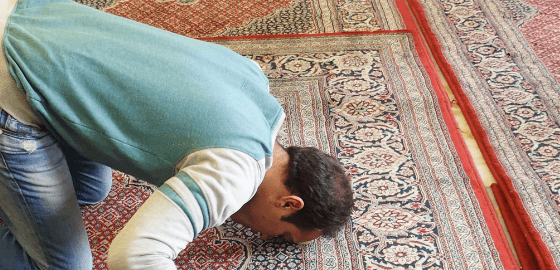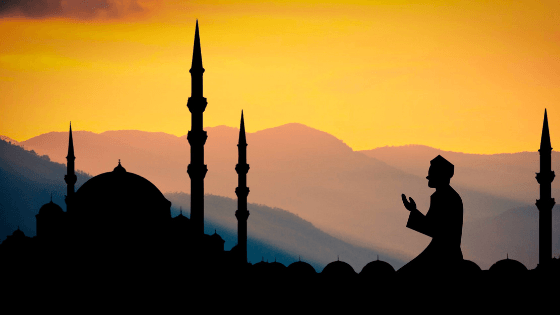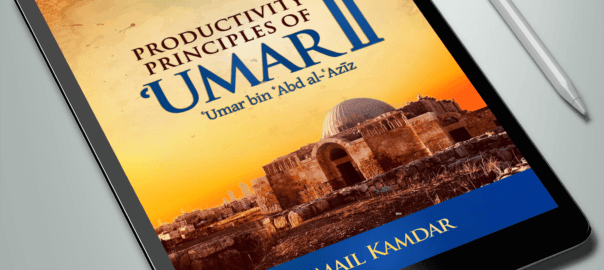This article is an extract from my 2015 book on Self-Confidence. The book has been published under three different names over the past six years including Best Of Creation, Self-Confidence, and Self-Confidence: The Islamic Way. In light of current world events, I wanted to share this chapter for free due to its relevance to our times.
Many of us are afraid of this world. We don’t understand it and fear what it might bring tomorrow. This fear cripples us and makes us retreat into our own bubbles. We avoid taking risks, trying new things or going to new places out of fear of what could go wrong, thinking it is safer to stay at home and avoid the world.
But avoiding problems is not possible, even if you enclose yourself in a tiny bubble. Becoming confident enough to chase your goals requires coming to terms with the nature of this world.
There are few things about this world that we all need to embrace and understand in order to move forward.
The first is to understand the purpose of this world. In the previous chapter, we learned that Allah created us to worship Him. Now let us reflect on why He created this world.
This is summarized beautifully in Surah Al-Kahf in which Allah says;
“Definitely, I made whatever is on this earth beautiful to test which of them are best in their deeds, and I will make all of it into dry soil,”
Surah Al-Kahf 18:7-8
This verse summarizes four important qualities about this world all of which are relevant to this topic i.e. that this world is beautiful, a test, changing and temporary.
The Test of the Beauty of this world
There are many places in the Qur’an in which Allah uses the word beauty to describe this world, and it truly is beautiful. There are many types of beauty in this world, including pure beauty, deceptive beauty and tempting beauty.
Pure beauty refers to the Halal and beneficial things of this world like Halal wealth, children, a beautiful spouse, a beautiful home or nature in general. These are things which Allah created and made beautiful for the believers to enjoy. The test in these cases is to thank Allah for these gifts and not allow them to distract us from obeying Him.
Regarding this, Allah warns us:
Say: If your fathers, your sons, your brothers, your wives, your kindred, the wealth that you have gained, the commerce in which you fear a decline, and the dwellings in which you delight, are dearer to you than Allah and His Messenger, and striving hard in His Cause , then wait until Allah brings about His Decision (torment). And Allah does not guide a rebellious people.
Surah At-Tawba 10:24
All of the things listed in this verse are Halal and good things. Yet, loving any of them more than Allah and His Messenger is problematic as it corrupts our intentions and goals, and it diverts us from the purpose of life. In this way, the good things in our life are a test.
Deceptive beauty refers to the evils of this world that are disguised as beautiful. The modern marketing industry is famous for this. It packages all forms of sin as good and beautiful and this leads many people down the wrong path towards self-harm and destruction. The test here is to recognize the evil hidden underneath the layers of beautiful wrapping and to avoid it as much as possible. Do not fall for the devil’s deception, as it will lead you down a part to darkness.
Allah warns us about this and says:
And I have appointed for them companions (from among the devils) who made their past and future sins seem attractive.
Surah Al-Fussilat 41:25
The worldly life has been beautified for those who disbelieve, and they mock the believers. But those who believe will rise above them on the Day of Resurrection, and Allah provides for whom He wills without restrictions.
Surah Al-Baqarah 2:212
Tempting beauty are things of this world which are indeed beautiful, but their beauty might be so overpowering that people are willing to violate the laws of Allah to have it. The two most common scenarios are women and wealth. Men are tempted to have beautiful women, and many do not have the confidence to do it the right way by marrying them and treating them equally, so they go down the path of evil to get what they want.
Likewise, people desire wealth and many don’t have the patience and trust in Allah to earn it the Halal way, so they take Haram shortcuts like dealing with Riba (Interest); and they end up with cursed wealth devoid of any blessings.
Yes, this world is beautiful but in this is a test for mankind. We are to enjoy the pure beauty of this world moderately, and to be patient with the prohibited. This patience will lead to even greater and more beautiful things in Paradise.
Allah says about this:
For mankind, (Allah has) beautified a strong love and desire for women, children, heaps of gold and silver, fine branded horses, cattle and tilled land. That is the enjoyment of the worldly life, but Allah has with Him the best return.
Say: Shall I inform you of something better than that? For those who fear Allah will be gardens in the presence of their Lord, beneath which rivers flow. They will dwell therein forever, and have purified spouses and Allah’s pleasure. And Allah is All-Seeing over His Servants.
Surah Aal-Imraan 3:14-15
The World is a Test
And We will surely test you with something of fear and hunger and a loss of wealth, lives and fruits. So give good tidings to the patient.
Surah Al-Baqarah 2:155
It is not only the beauty of this world that tests and tempts us. Everything in this world is a test. Just as good things are a test of gratitude, difficulties too are a test from Allah. In order to build our confidence, we have to accept the world the way it is. The world is not perfect, just like we are not perfect.
The world has beauty but it also has difficulties. Difficulties are a fact of life that every human must face and deal with. Nobody can go through this world without facing some kind of difficulty at one point or another. Running away or hiding in your home will not chase away the tests of life, rather it will bring the tests into your home.
We must understand that this world is a testing ground and we cannot escape that. This means whether we go out and live life, or stay at home afraid, either way tests will come our way. So why stay at home then? There is so much to do in this world. So much good that we can do. So many lives that we can touch. So many ways in which we can make this world a better place.
Yes, there will be trials along the way. This is the nature of the world. Life goes through cycles, we will have good times and we will have bad times. Utilize the good times to maximize your efforts and push on through the bad times too as they too will end sooner or later. Reality is that we can’t change the way the world is, we can just change how we approach and deal with the world. Allah has blessed us all with great skills and talents, use those skills to help His Creation and make this world a better place. That is how we can be among those who are best in their deeds.
The Temporary Nature of this world
And do not call on another god with Allah. There is no god except Him. Everything will be destroyed except His Face. His is the judgement, and to Him you will be returned.
Surah Al-Qasas 28:88
Everyone upon the earth will perish, and there will remain the Face of your Lord, Owner of Majesty and Honour. So which of the favours of your Lord would you deny?
Surah Ar-Rahman 55:26-28
This world will end, and our time in this world will probably end long before that. This is reality, and we must embrace it in order to stop fearing the unknown. Accepting that this world will end means accepting that it is constantly changing and that nothing we have will last forever.
Many people live frightened lives because they are afraid of change. The idea of anything in their life changing terrifies them and as a result, they are always anxious and disappointed because change is guaranteed to affect each and every one of us.
We change, our spouses change, our children change, our economies change, periods of peace and war interchange, presidents change, technology changes, careers and jobs change, nothing is guaranteed to remain in one constant state forever.
Change doesn’t have to be something bad. Change is what you make of it. In the 13th year of prophethood, Prophet Muhammad (peace be upon him) and his companions were forced into exile and had to flee to Madinah, leaving behind their home town, families and possessions. This was a drastic change and one that could have been perceived very negatively.
Yet, the Prophet (peace be upon him) embraced this change as a part of Allah’s place for him, and looked for ways to make it a positive change. He saw it as an opportunity to build a Muslim community and with much effort, Madinah became the first Islamic State and his new home. It remained his home even after Makkah was conquered, and it remains the most beloved place to Muslims in the world, even today 1400 years later.
In this story, the situation of the Muslims changed many times. From being an oppressed minority, to being in exile, to migrating to a new land, to establishing an Islamic State, to going to war against the aggressors, to peace treaties and finally to victory and conquest. In these 10 years, the only thing that was constant was change. Yet each change was embraced as something positive that will lead to a greater good. As a result, the Prophet (peace be upon him) and his companions accomplished more in two decades than many do in a lifetime.
Around a century later, another great figure had to embrace change when Umar Ibn Abdul Aziz, the governor of Madinah, was removed from his position and forced to move to Damascus. Umar was very sad to leave the beloved city and move to a more materialistic location but he accepted it as Allah’s destiny for him and embraced the change.
Within a few years of moving the Damascus, the centre of the Caliphate at that time, Umar Ibn Abdul Aziz found himself embracing another change. He was declared the new Caliph on the order of his dying cousin, King Sulaiman Ibn Abdul Malik and became one of the greatest rulers the world has ever seen. Had he not embraced the change of moving to Damascus, he might not have become the Caliph.
History has proven many times that every time someone embraced a change that Allah sent into their lives, it led to amazing things that the person never imagined. This is why change is not something to be feared, it is simply something to be accepted as a part of life that everybody experiences.
For whatever is in your capacity to control, make sure the changes are positive. For whatever is outside your control, accept that Allah knows what is best for you and embrace the changes in your life as new opportunities.
Accepting the temporary nature of this world also makes us work for a higher purpose. We will all leave this world one day, so why do we make it our biggest concern?
What we should really be concerned with is our Afterlife. Yes, there is nothing wrong with enjoying the Halal things of this world but they should not distract us from our purpose.
Compared to Paradise, the things of this world are worthless. Whenever there is a clash between what we want in this world and pleasure of Allah, always choose the latter.
Focusing on the Afterlife also helps us get through difficult times. We understand that nothing in this world lasts forever. Good times won’t last, enjoy them and be grateful to them. Bad times won’t last, push through them hoping to be rewarded in the Afterlife for your patience.
Focus on the Afterlife and don’t make the problems of this world your main focus. Enjoy the good that Allah sends you, and don’t forget to thank Him for it.
Pursue goals that will make this world a better place and that will count on your scale of good deeds on the Last Day. And take the bad days as they come as simply another test and opportunity for growth. After all, if we don’t have bad days, we wouldn’t appreciate the good days.
You Can Do It
Allah does not burden a soul beyond its capacity. It will have [the consequence of] what [good] it has gained, and it will bear [the consequence of] what [evil] it has earned. “Our Lord, do not impose blame upon us if we have forgotten or erred. Our Lord, and lay not upon us a burden like that which You laid upon those before us. Our Lord, do not burden us with that which we have no ability to bear. And pardon us; and forgive us; and have mercy upon us. You are our protector, so give us victory over the disbelieving people.”
Surah Al-Baqarah 2:286
This is the promise of Allah and it should keep us strong during difficult times. Understand that if Allah has sent a specific test into your life, it is because you have the capabilities to deal with it and pass it.
Allah would not have given you that specific test unless you were the right person to deal with it and overcome it. Remind yourself of this verse every time you are in a jam. There is no test in your life that you don’t have the ability to pass, and every human has been given the capabilities to be successful in both worlds.
Reflecting on this verse should give you confidence in your ability to overcome your current predicament. Allah chose you for it, because you have what it takes to deal with it, even if you haven’t discovered that yet. This belief should empower us to dig down deep and do our best in every situation.
The Win/Win Formula
The Prophet Muhammad (Peace be upon him) said:
Amazing is the affair of the believer, verily all of his affair is good and this is not for no one except the believer. If something good befalls him he is grateful and that is good for him. If something harmful befalls him, he is patient and that is good for him
Saheeh Muslim 2999
This Hadith is very powerful in helping us embrace this world with all its flaws. As believers, we must look at everything that happens to us as something good. When things go our way, it is a gift from Allah and we should be grateful to Him for it, and this is good for us in both worlds.
When things don’t go our way, we must be patient, solution-focused and ready to learn some life lessons through the experience, and that too is good for us in both worlds.
This means whatever happens to us in life is good for us, so why fear living. Go out there and make every day count. Be the best you can be. Accomplish whatever you can and be ready to face any setbacks or trials along the way.
There is no reason to avoid our duties and goals out of fear. Doing so won’t hold back the tests but it will hold you back from accomplishing anything worthwhile.
Allah created this world to test us. We are tested with good and with difficulties too. Things are always changing and nothing in this world is constant or eternal. Embrace the nature of this world and you will live a happier life and be able to accomplish more. Do not fear trials, failure or death. These are all natural parts of our experience in this world and unavoidable. Live each day as if it is your last, but make your plans for doing good deeds being optimistic that you will live a long time. Even if you pass away before accomplishing all your goals, Allah will accept your noble intentions and might even use others to accomplish your goals for you.
A Word about Death
“Remember often the destroyer of pleasures,” Prophet Muhammad (peace be upon him”
Ibn Majah 4258
Fear of death holds many of us back from doing anything. We fear our own deaths and the deaths of our loved ones. This fear is good if it stops us from doing foolish things that risk our lives like driving recklessly and consuming intoxicants. However, too many of us use it as an excuse to hold ourselves or our families back from doing good deeds.
Death is inevitable. Everybody you know will leave this world one day, as will you. There is nothing we can do to change that. Most likely, everybody you know will not be on this earth in a hundred years’ time and an entirely different generation will populate this earth. Fearing death is not going to change that or stop it from happening. The fact is that every human experiences the death of loved ones multiple times in his/her lifetime, unless that person died at a young age.
As there is no escaping death, we have to embrace it as a part of life. Eventually, we all will leave this world and when our time is up, it doesn’t matter whether we are out trying to make this world a better place, or cowering at home, either way we will have to face reality.
Remember that nobody has control over when they die, but we do choose how we live, so live!
Don’t be dead inside while your body is alive. Live your life and do whatever you can to leave this world a better place than you found it. Live such a life that when death comes, you are pleased to meet your Lord and He is pleased to meet you. You can’t escape death but you can turn it into a beautiful transition from this world into somewhere better.
[To the righteous it will be said], “Oh soul that is at peace, Return to your Lord, well-pleased and pleasing [to Him], so enter among My [righteous] servants And enter My Paradise.”
Surah Al-Fajr 89:27-30
To read the full ebook, get your copy here or for the best value, grab our Self Help Starter Pack here.






